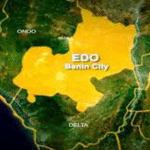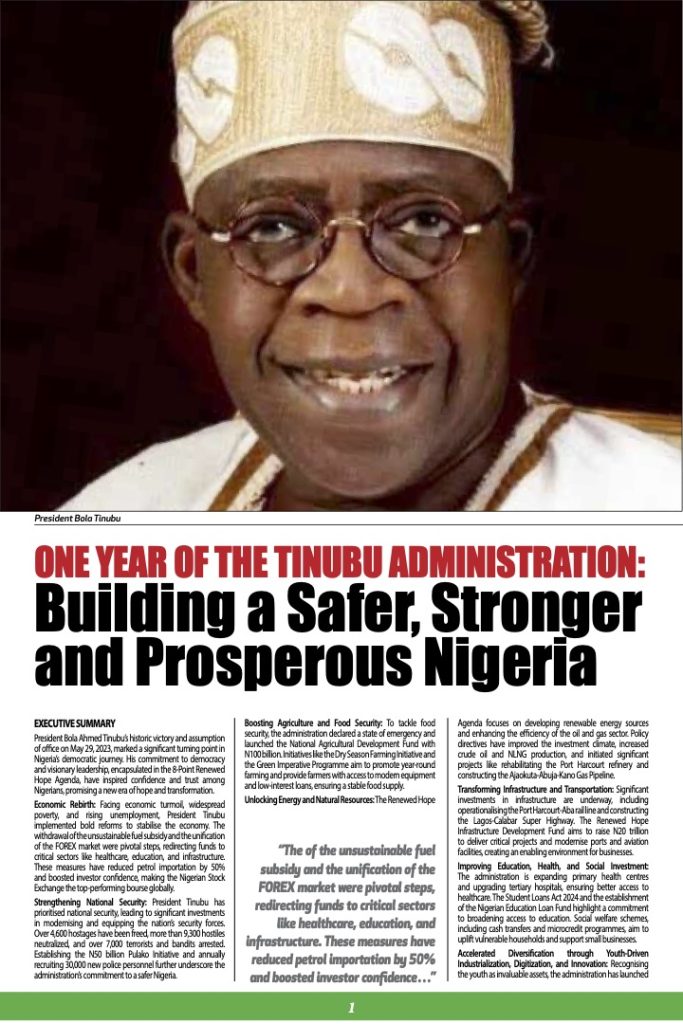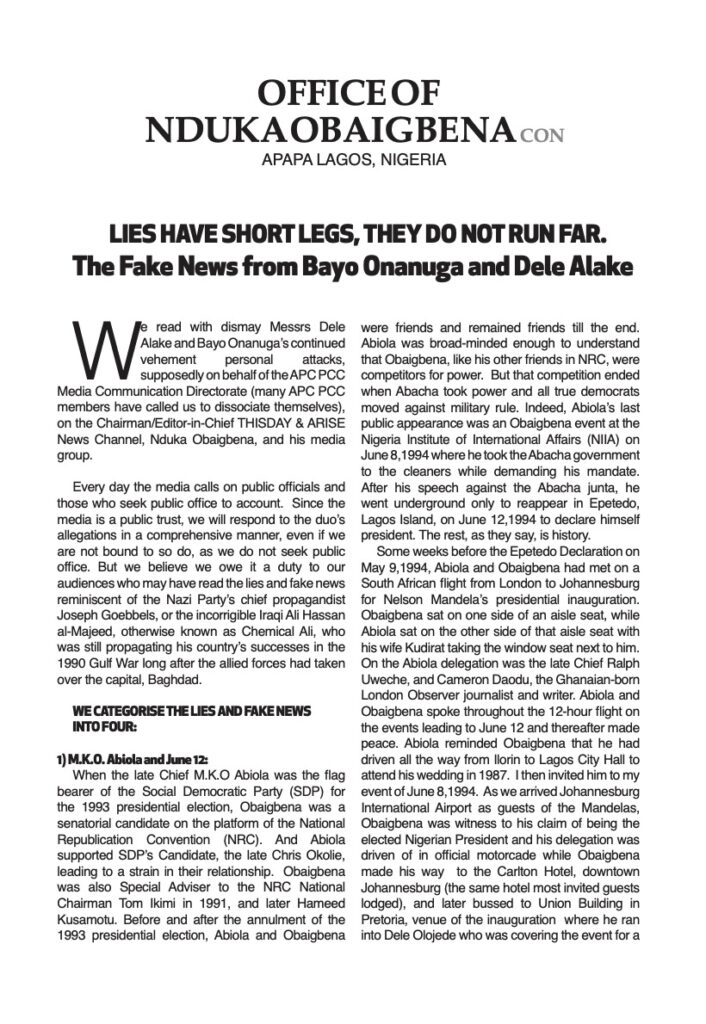Latest Headlines
2024 NBA Conference: My Takeaways

And it’s a wrap! The 2024 Nigerian Bar Association Annual General Conference (NBA-AGC) themed “Pressing Forward: A National Posture for Rebuilding Nigeria” ended last Thursday, with the inauguration of Afam Osigwe, SAN as the NBA President 2024-2026. We wish him an innovative and successful tenure.
Dr Ngozi Okonjo-Iweala’s Keynote Address
The Keynote Address delivered by Dr Ngozi Okonjo-Iweala at the opening ceremony of the NBA-AGC, gave me renewed confidence that the subject-matter of many of my discourses are on point. The title of her Address was “A New Social Contract for Nigeria’s Future”. On June 13, 2023, I had written my own piece, “Social Contract: The A-Side Vs. The B-Side” and coined my own two-fold Social Contract between the Government and the Governed (the Citizens/People), and between the Citizens themselves. The first leg of my theory is that the main obligation of the Government to Nigerians is contained in Chapter II of the 1999 Constitution of the Federal Republic of Nigeria (as amended in 2023)(the Constitution), that is, the achievement of the Fundamental Objectives and Directive Principles of State Policy, while the second leg, is contained in Section 24 of the same Constitution, the duties of the citizen, that is, the responsibility of the people to the Government, and then, to themselves. I concluded that both parties had certainly breached the Social Contract, either by non-performance, or not performing in accordance with the terms of the contract. See the case of Pan Bisbilder (Nig) Ltd v First Bank (Nig) Ltd 2000 1 SC 71 per Emmanuel Olayinka Ayoola, JSC. Dr Okonjo-Iweala however, stated that Nigeria requires a new social contract to put the country on the right path to economic growth.
1) Cross-Party, Cross-Society Agreement and Good Policy Consistency
As Dr Okonjo-Iweala looked at the social contract on the Government’s side, she used Peru as part of her case study (as well as Singapore, South Korea and India). She said that when she visited Peru recently, she expected their economy to be as toxic as their political environment appeared to be, but, surprisingly, there seemed to be a “cross-party, cross-society agreement that certain things in the economy, the country, policy and society are sacrosanct and shall not be touched or changed when administrations change”; therefore, their economy was in decent shape. That is, they have good policy consistency, no-go areas that are perceived to advance the progress of their country, which they do not allow politics to affect – possibly a component of the social contract subscribed to by all Peruvian politicians irrespective of what party they belong to, so as not to disturb the economic development of their country.
Nigeria neither has that cross-party, cross-society agreement, nor good policy consistency. On the contrary, we have bad policy consistency. We have a penchant for keeping bad policies, for example, a needlessly huge government structure complete with duplication and triplication of efforts and its accompanying astronomical cost of operation; extravagant, unnecessary government expenditure, using the excuse that that’s how it has always been done, and so the present Government is simply following laid down policy set by previous governments, instead of discarding such wasteful spending – like renovating government residential buildings for unjustifiable amounts, every four or eight years, depending on when the occupying official changes, and paying Legislators a severance package at the end of every legislative cycle, and then giving Legislators, including those who are returnees, sign-on benefits too, as if they are Freshers! As far as I’m concerned, such expenditure is needless and senseless, particularly in a country that is struggling financially. Dr Okonjo-Iweala stated that it is when economic and social policies are bad, that politics should intervene; but, when they are good, “why fix what is not broken”. Sadly, we mostly seem to do the opposite – we do not fix what is broken!
We also have a culture where, even if policies are good, the opposition discredits everything the government in power is doing or seeks to do. When the Jonathan administration sought to remove the fuel subsidy, the policy was opposed by majority of Nigerians, including many who are now part of this government’s administration. So, was it just a matter of opposing the fuel subsidy removal for opposing sake? While majority of Nigerians still oppose the removal of the fuel subsidy because of the hardship it has unleashed on them, why the change of heart for government officials who opposed it before, but, implemented the removal with ‘immediate effect and automatic alacrity’ (as Chief Eleyinmi of Village Headmaster used to say) upon assumption of office, and are now defending the policy?
In fact, the three major 2023 Presidential Candidates had vowed to remove the fuel subsidy, if they won the election. For each of them to intend to remove the fuel subsidy, it means that this policy may not have been wrong; the problem could be the implementation policy. Maybe if the policy had been implemented during the Jonathan administration in 2012, when Nigeria’s economy was more buoyant than it is today and could take more shocks (pre-Covid-19 Pandemic), the situation wouldn’t be as dire as it is today. It appears that in a country where politicians put the country and people first, the opposition are more likely to support a good policy that would be beneficial for all. But, when the ethos is to discredit one another’s policies, even the good ones, in order to gain popularity, all that develops is a culture of self-centredness and vindictiveness of the political class, which is antithetical to nation building.
2) A Culture of Corruption and Self-Centredness
In Nigeria, Government officials have also been known to enter into contracts that are detrimental to Nigeria, so long as they derive personal benefits from same – another culture of self-centredness/selfishness and corruption. Aside from the fact that Lawyers who know nothing about international/commercial agreements are selected to work on contract documentation with foreigners (possibly as a result of corruption, nepotism and the like), Government via its officials, have been accused of entering into fraudulent agreements with foreign parties that Nigeria may not necessarily be able to perform, and then connive with the foreign contracting parties to benefit from penalty clauses arising from breach. During the Breakout Session with the Attorney-General of the Federation, one of the Commentators called upon his office to do a proper review of all foreign contracts.
The recent Ogun State v Zhongshan Ltd, Nigeria v P & ID and Air Nigeria/Ethiopian Airlines, may be examples. The Minister of Aviation, Festus Keyamo, SAN, apparently made a presentation to President Tinubu, stating that the deal he inherited from Hadi Sirika’s tenure regarding Nigeria’s transaction with Ethiopian Airlines, wouldn’t be beneficial to Nigeria! Again, in P & ID, which gas would Nigeria have supplied to P & ID to fulfil its contractual obligations, when we are still actively involved in gas flaring instead of harnessing same? From the beginning, the contract didn’t appear to be workable on Nigeria’s part. I don’t know whether the agreement between Governor Daniel’s Ogun State administration and Zhongshan was good or bad, and why the subsequent Amosun administration cancelled it, but surely, even if the agreement was detrimental to Ogun State, there should have been a thorough review of the agreement before terminating it, in order to avoid the ensuing unpleasant consequences that Nigeria is now experiencing. All this is evidence that successive Nigerian governments/sub-nationals appear to be nonchalant about Sections 14(2)(b) & 16 of the Constitution, which are concerned with the welfare of the people and achieving optimum economic objectives for the benefit of Nigerians. What seems more sacrosanct in Nigeria, are economic policies that benefit private pockets, not the country.
Ingredients for Nigeria’s New Social Contract
Dr Okonjo-Iweala admitted that Nigeria isn’t where it should be, “and that’s why we are still discussing nation-building more than 60 years after independence”. 60+ years ago, South Korea was in a worse situation than Nigeria; it’s now a First World country; Nigeria is still under-developed. Before Lee Kuan Yew (LKY), Singapore was a mess. Today, Singapore is prosperous in more ways than one; even its Singapore General Hospital, a Government, Public Hospital, is one of the best in the world.
Dr Okonjo-Iweala believes that Nigeria needs a new social contract, as the basis for “the virtuous circles of reform, growth, peace, security and trust that have too long eluded us”. She is right. She advocated an agreement on policies and parameters which must be institutionalised by enacting them into law or inserting them into the Constitution, only to be changed by means of National Referendum. But, this cannot be achieved without the buy-in of Government and politicians, as it is mostly their failure in governance that has set Nigeria on a trajectory of failure. Dr Okonjo-Iweala said she wouldn’t play the blame game, but, I must respectfully differ from her position because I believe that some things must be said; if not, Government will continue to take Nigerians for granted.
Dr Okonjo-Iweala’s first ingredient for this new social contract she said, must be a shared understanding that security of life and property is a priority, without which there can be no economic or social development. Take agriculture for example, if the sector could even be half as productive as it was in the days before oil became Nigeria’s main source of revenue, it would not only create employment in the rural areas, there would be vertical integration and export opportunities, which would rake in good income for the country. However, because of insurgency, banditry and herdsmen wahala, people are no longer able to go to their farms, and agricultural output has dropped significantly. Dr Okonjo-Iweala stressed that the weaponisation of security for political purposes must stop – that politicians instigating violence to show that their opponents cannot govern, is unacceptable. She also mentioned that the understanding by all, that the security of our national assets is paramount, is crucial. As for me whether it’s corruption/government officials plundering our common wealth, or Nigerians engaging in crude oil theft, such criminal activities undermine Nigeria’s economic growth and financial well-being.
Just as the administration of justice sector talks about the importance of the independence of the Judiciary for optimal efficiency, Dr Okonjo-Iweala emphasised the importance of the independence of the CBN. See Section 1(3) of the Central Bank of Nigeria Act 2007 (CBN Act). She denounced the use of CBN as a “fiscal agent, asking for printing of Naira beyond the agreed Way and Means limits”, and the use of other manipulative tactics through the CBN on the economy (see generally the functions of the CBN in the CBN Act); transparency in FAAC Allocations and full disclosure to citizens about how the funds are being utilised; sensible limits for public debt, and other measures to get Nigeria back on the right track. The right environment for domestic and foreign direct investment, is also needed for economic growth and a healthy balance sheet.
Conclusion
My take away from Dr Okonjo-Iweala’s Address firstly, is that it is still possible to steer Nigeria back on the path of prosperity and progress. If we want to press forward and build a better Nigeria, Section 14(2)(a), (b) & (c) of the Constitution which hitherto appears to be little more than a decoration in the Constitution, must be a very active part of the new social contract between Government and the people. While Government must take security more seriously as it is the bedrock of any progressive society, it must not only acknowledge, but bear in mind that sovereignty belongs to the people and they have a constitutional right to participate in their government, such involvement going beyond simply voting. The people cannot continue to be treated as dormant partners, who are only contacted during election season! Their needs must be prioritised. Government must also learn to be more truthful to the people. How many times has the resumption date of Nigeria’s refineries been shifted?
Secondly, Government and its officials must imbibe the patriotism, integrity, transparency, discipline, focus and determination of LKY – what I can do for my country for it to achieve its potential, not what my country can do for me. Once people are physically secure while going about their daily activities, and they get the feeling that Government is concerned about their welfare, introducing and implementing good policies, as opposed to indulging in lavish expenditure for themselves while the people are subjected to untold hardship, Nigerians will be more inclined to honour their part of the social contract by desisting from evil activities like oil theft, and stripping of infrastructure built for their benefit to sell for personal gain, for example, theft of clips from railway tracks, manhole covers and railings from bridges. It is poverty and unemployment that lead to disillusionment, crime and insecurity. When things are going well, who would want to die, let alone allow themselves to be brainwashed by ignorami to blow up themselves and others, in order to go and enjoy in Paradise?! It is the frustration from how bad things are, that makes people easy prey for such nonsense, believing that they have absolutely nothing to lose. If you look at the happier countries in the world, one may find that their suicide rate is low or zero. Suicide which was once rare in Nigeria, has become a common occurrence.
Thirdly, like the Peruvians, Nigerian politicians, across party lines, must subscribe to good governance; to the continuation of good policies irrespective of which administration introduced them, and the independence of institutions like the Judiciary. In short, Nigerians must agree that in this new social contract, all hands must be on deck to build a better country. But, once Government starts to renege on its part of the social contract, it usually has a catastrophic effect on the people and the country, as we are seeing in Nigeria today; the result of the breach of the social contract by successive governments.

















